
Greek Controlled Shipping: An information paper based on data provided to the GSCC by S&P Global Market Intelligence
Please find here below an information paper on Greek controlled ships over 1,000 GT, registered under the Greek and other flags as of 4 March 2024, based on the attached 11 tables, provided by S&P Global Market Intelligence (previously IHS Markit).
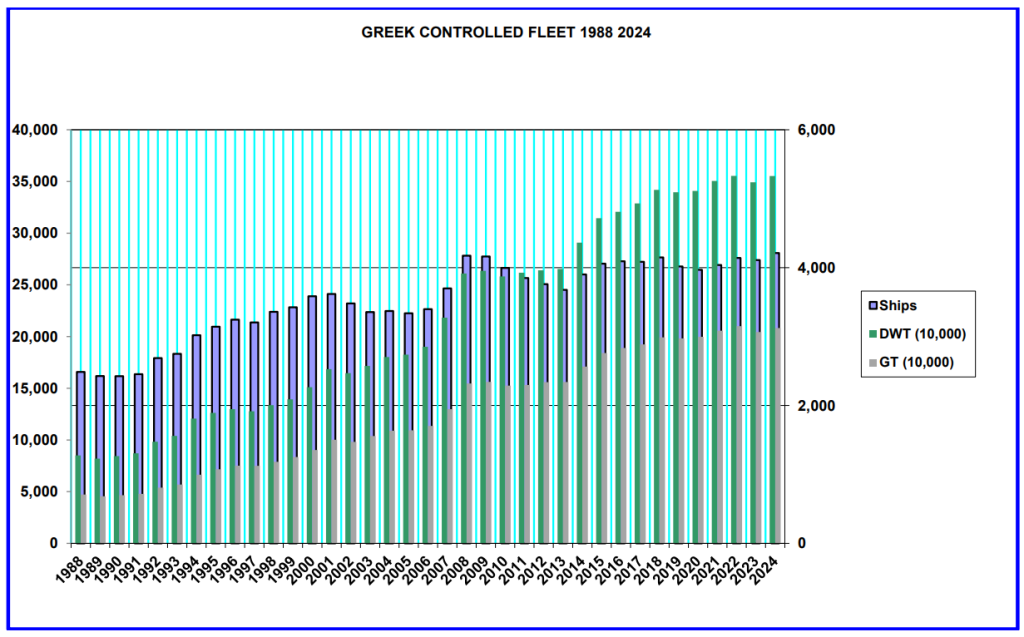
For the 37 th consecutive year the GSCC presents statistical data, in the form of 11 tables on Greek-controlled ships over 1,000 GT, registered under the Greek and other flags. The data has been provided by S&P Global Market Intelligence. The following is a short analysis of the data provided, prepared by the GSCC Secretariat.
Information from Table 1, compared with corresponding data from the previous year, shows that during the year to March 2024, the Greek-controlled fleet has increased in terms of number of vessels, DWT and GT. According to the data, as of 4 th March 2024, Greek interests controlled a record 4,212 vessels of various categories, of 355,209,500 total DWT and 208,252,588 total GT. Compared with the previous year’s data, this represents an increase of 102 vessels, 5,992,356 DWT and 3,905,226 GT. The figures do not include 373 vessels of various categories which are on order from shipyards, amounting to a total of 33,143,130 DWT and 22,889,399 GT. Interestingly, the orderbook figures represent a 50% increase in new orders, which indicates a larger interest in new technology vessels by Greek owners.
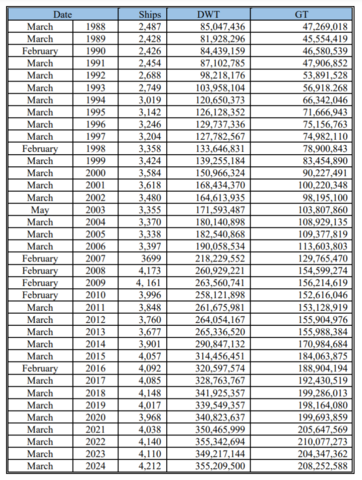
For the first time in a number of years, the fleet registered under the Greek flag has remained stable in terms of ship numbers, still comprising 496 ships. This reflects the positive outcome of recent reforms in the Greek registry. However, a slight decrease in terms of DWT and GT has been noted, with the figures now standing at 30,759,394 GT
and 51,694,269 DWT, as compared to the previous year’s figures of 31,150,523 GT and 52,768,867 DWT.
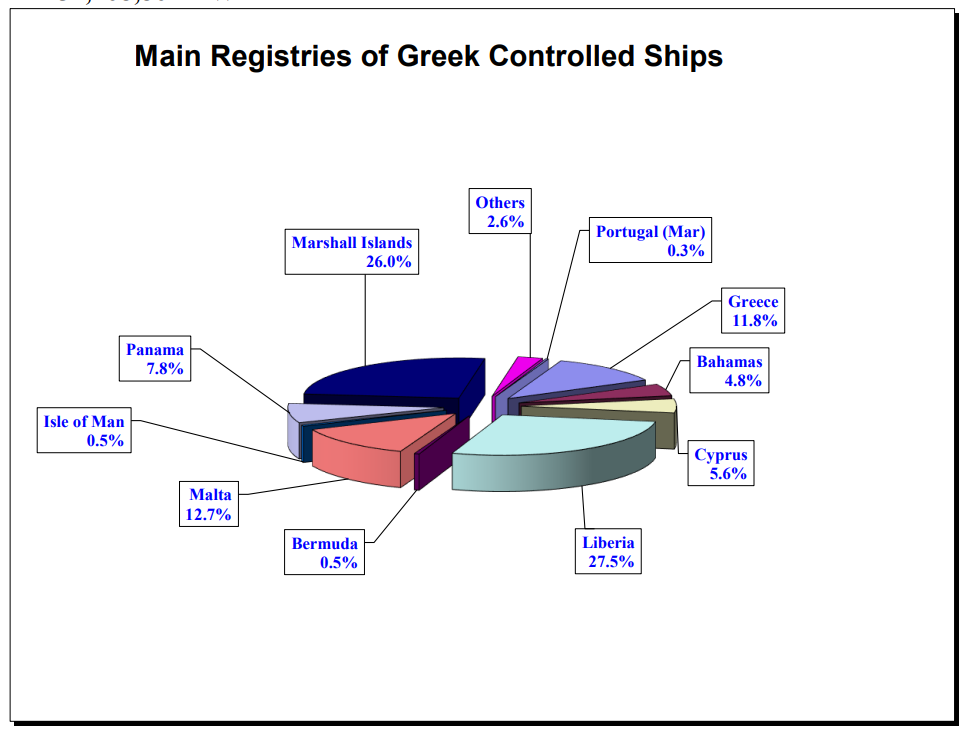
The Greek-controlled fleet is registered under some 32 flags.
Flag analysis of ships owned by Greek parent companies, which gives the total number of ships, total DWT and total GT, registered under each of the main registries used by Greek owners, compared with the corresponding table of last year, shows that Liberia gained 79 ships, Marshall Islands gained 34 ships, Cyprus gained 19 ships and Portugal
gained 2 ships.
On the other hand, the remaining flags noted a slight decrease in the number of registered vessels, with the Maltese flag recording a loss of 23 vessels, Bahamas 8 ships, while Panama, Bermuda and Isle of Man flags recorded a loss of 2 vessels each.
As mentioned before, the number of vessels registered under the Greek flag remained the same this year, although a slight decrease of 1,074,598 in DWT and 391,129 in GT was noted.
The table below shows the gains and losses in number of ships, GT and DWT for the main registries of Greek-controlled ships.
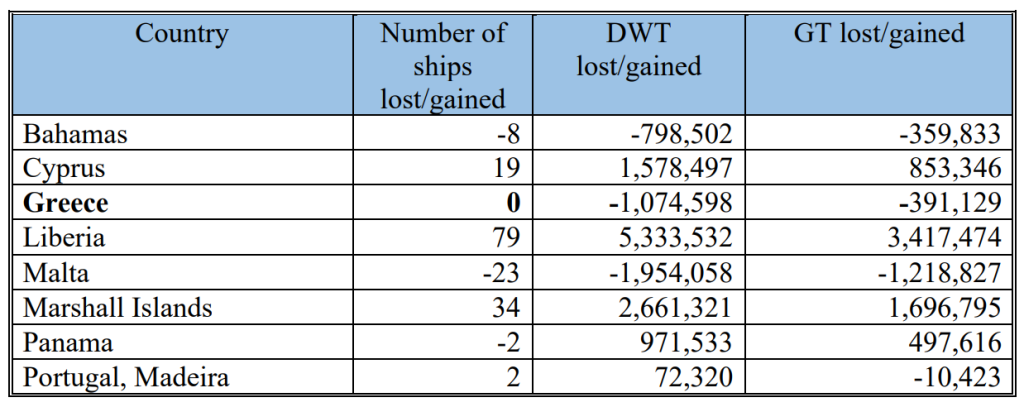
Overall, the Liberia and Marshall Island flags are at the forefront of the Greek-owned fleet with 1,159 and 1,096 Greek-owned ships, respectively, on their registers. In terms of DWT, Liberia accounts for 104,171,885, representing 29.3%, and Marshall Islands accounts for 86,425,552, representing 24.3 % of the total DWT of the Greek-owned
fleet.
The Greek flag follows with 496 ships of 51,694,269 DWT. It should be noted that the Greek flag remains in third place globally in terms of DWT, as it represents 14.5% of the total DWT of the Greek-owned fleet.
In terms of DWT, Malta comes next with 536 ships of 48,815,924 DWT, representing 13.7% of the total DWT of the Greek-owned fleet. Panama follows with 327 ships of 21,697,189 DWT, Bahamas with 202 ships of 17,549,992 DWT, and Cyprus with 234 ships of 16,812,743 DWT.
Furthermore, it should be noted that the total number of vessels registered under EU flags stands at 1,278, which accounts for 30.3% of the Greek fleet. This figure has slightly declined, when compared to the previous year’s figure of 1,280 vessels, which represented 31.1% of the Greek fleet.
TABLE 2: Ship Type, DWT and Order Book – Greek Parent Companies
Comparing Table 2 with the corresponding table of the previous year, the following increases/decreases in number of ships and DWT are noted.


With regard to the order book as to ship type, currently there are 112 oil tankers on order for account of Greek owners, 32 chemical & products tankers, 77 liquefied gas tankers, 107 ore & bulk carriers, 35 container ships, and 10 cargo vessels on order.
TABLES 2 & 3: Comparison between the world fleet and Greek owned fleet per ship type
The following table presents the Greek-controlled fleet according to number of ships, in comparison with the world fleet, providing the figures as to ship type.
What is notable is that Greek parent companies represent 23.7% of the world Tanker fleet, 16.1% of the world Ore and Bulk fleet and 10.1% of the Liquified Gas fleet.
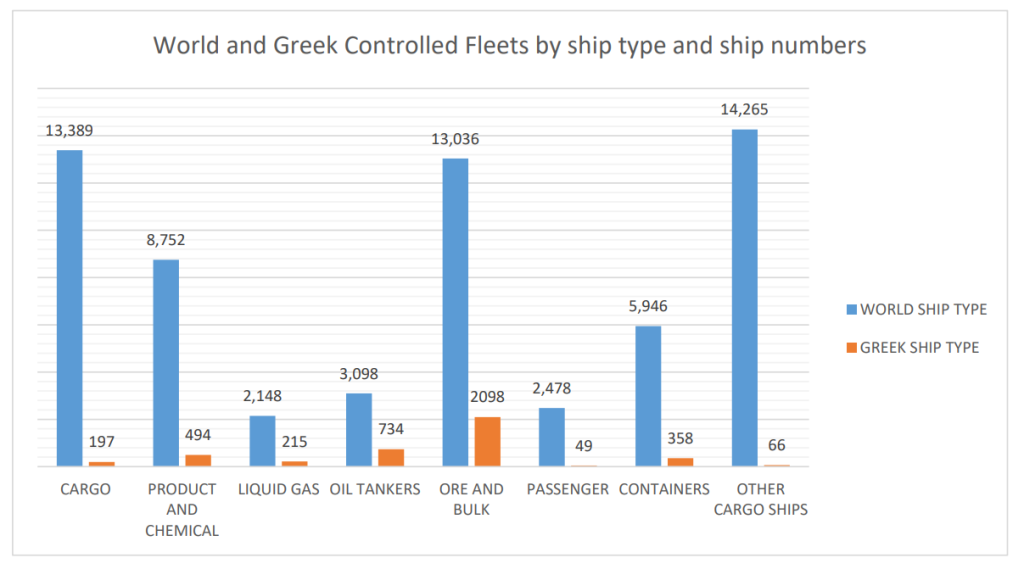
Overall, as shown in Table 4 of the attached data, the Greek-owned fleet stands at 6.7% of the world fleet in terms of ship numbers, 12.9% in terms of GT and 15.1% in terms of DWT.
The Greek-registered fleet as a percentage of the world fleet, in terms of number of ships, GT, and DWT is 0.8%, 1.9% and 2.2% respectively, according to Table 9. It should be noted, however, that for oil tankers the percentages are 5.5%, 5.9% and 6% respectively.
TABLES 3 & 4: Ship Type of the World Fleet and the Greek Fleet
Due to the unstable situation in Ukraine/Russia and the Red Sea, as well as the low water levels in the Panama Canal and the forthcoming regulatory requirements, slight increases and decreases were noted in most of the categories of the Greek-owned fleet.
In particular, an increase in the Greek fleet as a percentage of the world fleet was recorded in the categories of Ore & Bulk Carriers, Cargo and Other Cargo ships.
The remaining categories recorded a slight decrease in terms of number of ships and DWT, in relation to the corresponding world fleet type for the year 2023.
Compared to the previous year, the percentages are as follows:
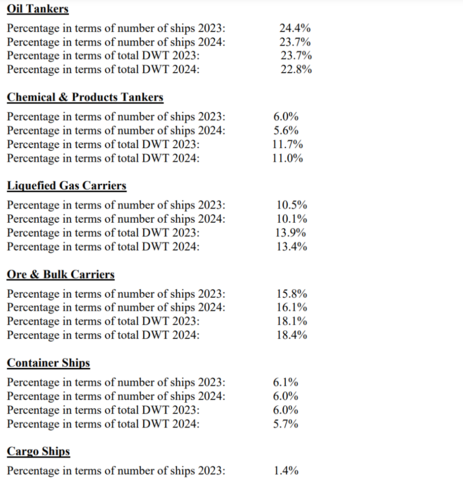
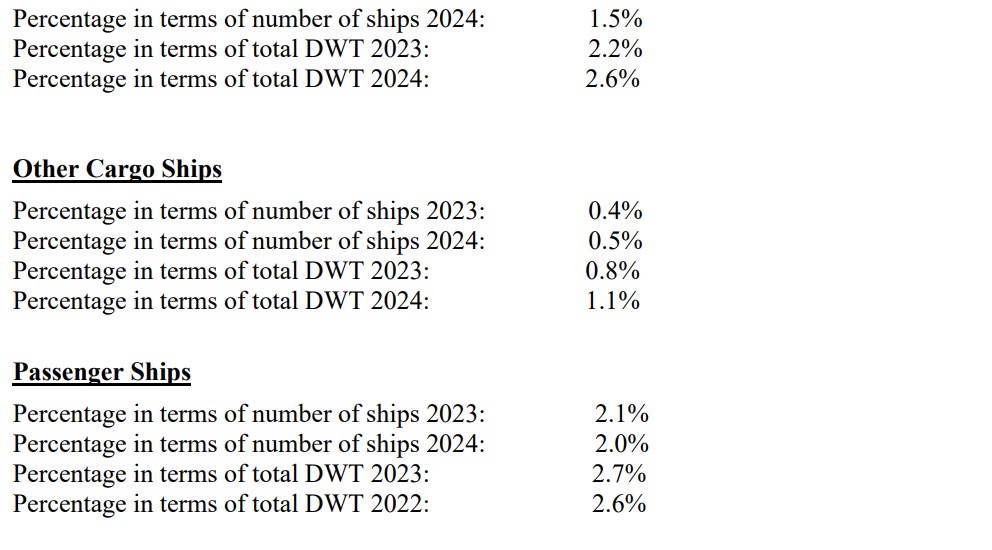
TABLES 5, 6 & 10: Average Age Analysis of Existing Ships owned by Greek Parent Companies, Registered ships and the World Fleet
The average age of the Greek-controlled fleet in terms of ships increased slightly compared to the previous year, but nevertheless continues to be 4.5 years below the average age of the world fleet.
The average age of the Greek-controlled fleet in terms of ships now stands at 13.7 years, in comparison to 18.2 years for the world fleet. In terms of GT and DWT, it is 12.1 and 12 years respectively, as against 13.1 and 12.8 of the world fleet.
The average age of the existing Greek-flag fleet recorded a slight increase in terms of ship numbers, now standing at 15.5, in comparison to 15 in 2023. A slight increase has also been noted in terms of GT and DWT, with values of 10.3 and 9.9 respectively, as against 10 and 9.7 years in 2023.
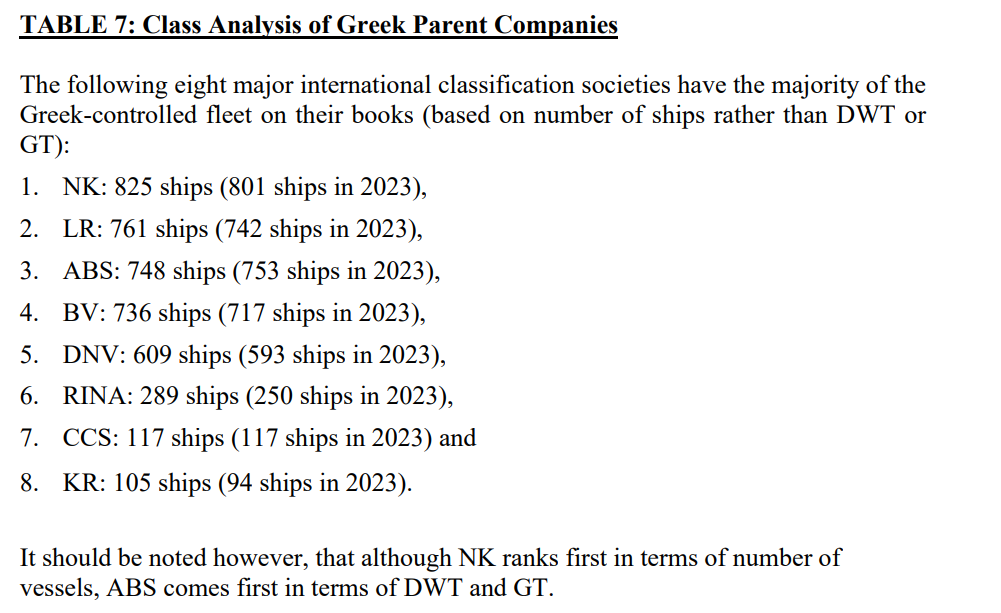
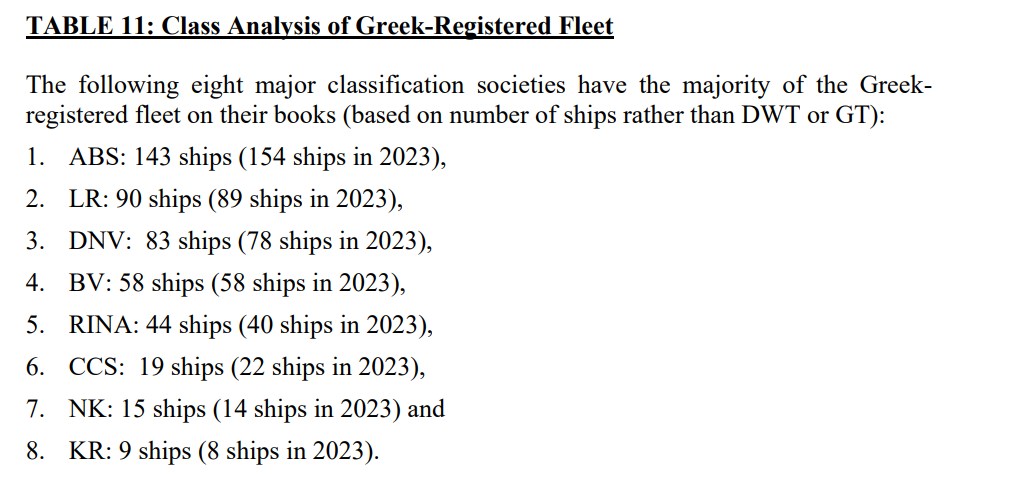
__
Many Congratulations to Radm (HCG) Konstantinos Amarantidis, the director of the Greek Shipping Co-operation Committee and the Secretariat, who oversees this report the last 12 years.





